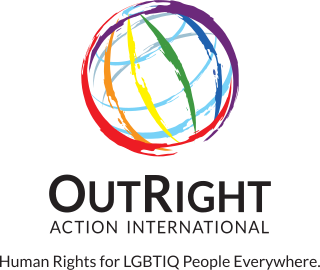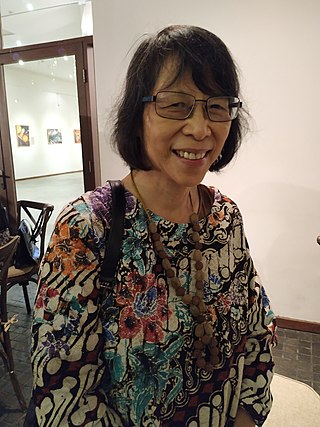
Urvashi Vaid was an Indian-born American LGBT rights activist, lawyer, and writer. An expert in gender and sexuality law, she was a consultant in attaining specific goals of social justice. She held a series of roles at the National LGBTQ Task Force, serving as executive director from 1989-1992 — the first woman of color to lead a national gay-and-lesbian organization. She is the author of Virtual Equality: The Mainstreaming of Gay and Lesbian Liberation (1995) and Irresistible Revolution: Confronting Race, Class and the Assumptions of LGBT Politics (2012).
Opposition to legal rights for lesbian, gay, bisexual, transgender and queer (LGBTQ) people exists throughout the world. LGBTQ rights opponents may be opposed to the decriminalization of homosexuality; laws permitting civil unions or partnerships or supporting LGBT parenting and adoption, LGBT military members, access to assisted reproductive technology, and access to gender-affirming surgery and gender-affirming hormone therapy for transgender individuals.

OutRight International (OutRight) is an LGBTIQ human rights non-governmental organization that addresses human rights violations and abuses against lesbian, gay, bisexual, transgender and intersex people. OutRight International documents human rights discrimination and abuses based on their sexual orientation, gender identity, gender expression and sex characteristics in partnership with activists, advocates, media, NGOs and allies on a local, regional, national and international level. OutRight International holds consultative status with ECOSOC.

Bisexual erasure, also called bisexual invisibility, is the tendency to ignore, remove, falsify, or re-explain evidence of bisexuality in history, academia, the news media, and other primary sources.

The Hirschfeld-Eddy Foundation was founded in Berlin in June 2007. It is a foundation focused on human rights of lesbian, gay, bisexual and transgender (LGBTQ) people.

Lesbian, gay, bisexual, transgender, and queer (LGBTQ) people in Indonesia face legal challenges and prejudices not experienced by non-LGBTQ residents. Traditional social norms disapprove of homosexuality and gender transitioning, which impacts public policy. Indonesian same-sex couples and households headed by same-sex couples are not eligible for any of the legal protections available to opposite-sex married couples. Most parts of Indonesia do not have a sodomy law, and the country does not currently prohibit non-commercial, private and consensual sexual activity between members of the same-sex, yet there is no specific Indonesian law that protects the LGBT community against discrimination and hate crimes. In Aceh, homosexuality is illegal under Islamic Sharia law and it is punishable by flogging or imprisonment. Indonesia does not recognize same-sex marriage.
Bahasa Binan is a distinctive Indonesian speech variety originating from the gay community. It has several regular patterns of word formation and is documented in both writing and speech. One pattern of word formation modifies standard Indonesian roots to have e as the first vowel and ong closing the second syllable—hence providing regular assonance with the standard Indonesian word bencong, a male homosexual, trans woman, or male crossdresser. Another word formation pattern adds -in- infixes to other Indonesian roots. The best example is the word binan itself, formed with the word banci, "male transvestite", to which the -in- infix has been added and from which the second syllable -ci has been dropped. Bahasa Binan also uses a range of standard Indonesian words with altered meaning. The standard word for "cat", kucing, is used in Bahasa Binan to denote a male prostitute. Another word with wide currency in Bahasa Binan, but actually typical of standard Indonesian informal word formation, is waria from wanita (woman) + pria (man), meaning "transvestite".
Homosexuality in Indonesia is generally considered a taboo subject by both Indonesian civil society and the government. Public discussion of homosexuality in Indonesia has been inhibited because human sexuality in any form is rarely discussed or depicted openly. Traditional religious mores tend to disapprove of homosexuality and cross-dressing.

LGBT+ Liberal Democrats is a British lesbian, gay, bisexual, transgender and other sexual minorities equality group of the Liberal Democrats political party. The organisation is one of several Specified Associated Organisations, giving it special status within the party, and has been referred to as one of the "most important" of such groups. The group campaigns both within the party and UK-wide on LGBT+ issues, as well as mentoring and providing advice to the party's candidates.
Indonesia does not recognise same-sex marriage or civil unions. Marriage laws forbid same-sex marriages and prevent the registration of marriages validly performed abroad.
Rauda Morcos is a Palestinian–Israeli lesbian poet and LGBTQ activist, whose hometown is in Northern Israel, living in Haifa in Israel. In 2003, she was outed as a lesbian by a national newspaper, leading to dismissal from her job, physical assaults, and her car being damaged. She then helped other women in setting up Aswat, the first Palestinian group dedicated to supporting lesbians, which she initially led.

The LGBT Centre Mongolia was founded in 2007 and is based in Ulaanbaatar. After a legal struggle, it was officially recognised in 2009. It then submitted reports to the United Nations which encouraged the Mongolian government to change its criminal code. The centre supports LGBT rights in Mongolia and has organised an annual Pride march since 2013. It was awarded the Felipa de Souza Award in 2011.
The Women's Support Group (WSG) is a Sri Lankan organisation dedicated to helping lesbian, bisexual and transgender women. It was set up in 1999 by amongst others Rosanna Flamer-Caldera. It has won the Felipa de Souza Award twice.
Companions on a Journey (CoJ) is a Sri Lankan LGBT support group founded in 1995. It campaigns to change the laws which criminalise homosexuality and to educate people about sexuality. The Women's Support Group grew out of CoJ, the two organisations sharing the Felipa de Souza Award in 2001. By 2014, CoJ had over 1,400 members and branches across the country.
Yasemin Öz is a Turkish lawyer and LGBT rights activist. Whilst studying law, she founded KAOS GL and writes reports monitoring human rights issues in Turkey. Öz participates in UN Women groups and was given the Felipa de Souza award by OutRight Action International in 2013.
Carlos Jáuregui was an Argentine LGBT rights activist. He founded La Comunidad Homosexual Argentina in 1984. In the early 1990s, he set up Gays por los Derechos Civiles and organised the first Pride march in Buenos Aires. He died from an HIV-AIDS-related illness at the age of 38. In memorial, a national day of activism for sexual diversity was established. He was posthumously given the Felipa de Souza Award, and, in 2017, a station was renamed after him on the Buenos Aires Underground.

GALZ An Association of LGBTI People in Zimbabwe is an organisation established in 1990 in Harare to serve the needs of the lesbian, gay, bisexual, transgender and intersex (LGBTI) community in Zimbabwe. GALZ's vision is "a just society that promotes and protects human rights of LGBTI people as equal citizens in Zimbabwe".

Melanita Pranaya Budianta, born Tan Tjiok Sien and better known as Melani Budianta, is an Indonesian scholar of feminism, postcolonialism, and multiculturalism.









